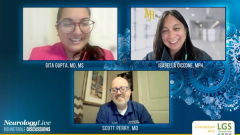
Enhancing Clinical Management of LGS Through Collaboration With Stakeholders

Experts underscored that stakeholder collaboration, including clinicians, caregivers, and industry partners, can play a critical role in advancing understanding and management of LGS. [WATCH TIME: 3 minutes]
WATCH TIME: 3 minutes | Captions are auto-generated and may contain errors.
Episodes in this series

Lennox-Gastaut syndrome (LGS) is a rare epilepsy syndrome that typically begins in childhood and is associated with frequent seizures, cognitive impairment, and long-term disability. Earlier this summer, the LGS Foundation hosted its 3rd biennial
In collaboration with
In this third episode, experts highlighted the importance of multidisciplinary collaboration in improving care for LGS. Specifically, Perry emphasized the value of pooling expertise across fields, including adult providers, pulmonologists, and caregivers, to address gaps in knowledge and patient care. Gupta then shared her experience of collaborating with colleagues in neurology and industry, noting that even brief interactions facilitated idea-sharing and progress on disease management projects. Overall, the clinicians during the discussion underscored that connecting diverse stakeholders fosters innovation, accelerates research, and informs patient-centered clinical strategies.
Transcript edited for clarity.
Isabella Ciccone, MPH: So, one of the main themes of the agenda is connecting with diverse stakeholders. And I have to ask on that—how does collaboration among different stakeholders enhance, or, you know, try to enhance, clinical management of LGs across different groups, different age groups?
Scott Perry, MD: Yeah. Well, it's essential, first of all, if we're going to accomplish any of the things we want to accomplish, for a variety of reasons. Number one, because any one person is only going to see so many people with a condition, right? So we must collaborate, even within a field, to have enough patients, to have enough data, to have enough understanding to answer the questions. So, what I was talking about with the PERC network—working together—that's key to get that epilepsy information. But then, the group that we had at this meeting was outstanding, because we had the pulmonologists, we had people from other fields who had no relationship to LGs whatsoever. They were just coming to give us information about how they've handled their chronic disease states and how they made progress.
Probably the people I was most excited to see in the crowd are, number one, the parents and caregivers, because they have a very good perspective that informs how we do the work. They really help us arrange what's most important to them, which is the direction we should be going. But to see the adult providers that were there—it was great to see some adult neurologists and epileptologists in the audience who immediately connected. And now they know that there are other adult providers who have an interest in LGS that they can collaborate with and work with. I mean, the ideas that started flowing when they started talking to each other were exciting, because that's a place where we’ve got a significant gap, and I’m glad we’ve got some people who are filling it.
Gita Gupta, MS, MS: I agree. I have a personal experience. I ended up being able to talk with people from pharma, and, you know, I’m new to my role at Johns Hopkins, but I met people at Hopkins who are in the field of neurology who are interested in collaborating, and we ended up sharing ideas. I was able to help fill in some gaps in their sleep-related projects. And I think even just in that short, few-day time frame, being exposed to each other in a way that we typically aren’t in the hospital or our own work setting, was so helpful and really exciting. And it’s great to see that there have been some constructive steps—little constructive steps—moving people’s projects forward toward hopefully finding out more answers about the disease and how to treat it.
Newsletter
Keep your finger on the pulse of neurology—subscribe to NeurologyLive for expert interviews, new data, and breakthrough treatment updates.











